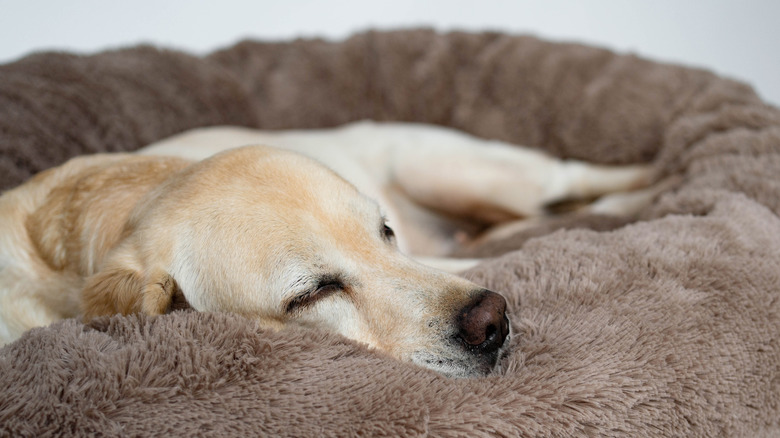How Your Dog's Own Bed Can Cause Them To Have Allergies
When it comes to our beloved fur babies, the last thing in the world we want is for them to be even slightly uncomfortable. And, if you've ever had allergies of your own, you know that they're a total bummer. While we can pop a Benadryl or something similar, our fur babies don't have that luxury. That's why, if your dog is suffering from allergies, it's important to figure out why stat.
In a lot of cases, our dog's bed can be the source of their allergies (per Wag Walking). But how exactly do we know that our dogs are suffering from allergies? While sneezing may be part of it, it's not as though your dog is going to have a stuffy nose and go running for the tissue box every five minutes.
"They may become itchy, the skin may become red and inflamed," veterinarian Dr. Ashley Rossman, DVM, CVA told Wet Paws Dog Grooming, adding that if the problem isn't remedied it can lead to dermatitis. How can you solve the issue? By washing your dog's bed. If we should wash our sheets once a week or every two weeks at the very latest, then the same goes for our dogs (via Casper).
Here's why you need to make washing your dog's bed more of a priority than it might be.
Dust mites
As much as we may want to think that our homes are perfectly clean and there couldn't possibly be any dust mites anywhere, the reality is you can't completely rid your home of them; you can only decrease them in number with washing and cleaning regularly (via Mayo Clinic). But because dust mites are just a part of life, you can't be surprised that they'd make their way into your dog's bed if it's not washed on a regular basis, causing allergies in your fur baby.
"Pillows, bedding, and carpets are frequent sources for dust mites, as well as hard-to-clean areas underneath sofas or beds," assistant medical director at the Animal Medical Center of Mid-America Dr. Travis Arndt, DVM told PetMD.
Washing your dog's bed once or twice a week, in extremely hot water, then drying it in the hottest heat the bed can bear, is one step in decreasing the number of dust mites that might be in their bed causing them allergies, according to Healthline.
Their bed's fabric
Unless you stick to organic, natural fabrics and stuffing for your pet's bed, their bed — even before we toss in dust mites — could also be a source of their allergies.
"Manufacturing synthetic fabrics requires certain chemicals and processes," the veterinary staff manager for the ASPCA Community Medicine Department Dr. Hyunmin Kim explained to PetMD. "These chemicals, such as flame retardants, are known to be allergenic. Some fabrics also allow the accumulation of dust mites, mold, mildew, and bacteria that can exacerbate skin sensitivities."
A good way to keep your dog's bed as allergens-free as possible is to go with cotton, hemp, or hypoallergenic beds. The latter is made specifically to limit dust mites, mold, and mildew (via Diamond Pet). So, if washing their bed every one to two weeks isn't cutting it and the allergies persist, maybe it's time to get a new bed; a hypoallergenic bed to be exact.
If you find that washing the bed regularly isn't easing their allergies, look elsewhere in the house. Other pets, certain plants, household chemicals, and smoke can also contribute to your dog's allergies, per Wet Paws Dog Grooming. If you search high and low, and still can't find the source, it's time to call your vet. No pet should have to deal with allergies. Our fur babies are only here for an unfairly short amount of time, so every second of their lives should be comfortable and happy. Doing what it takes to nip their allergies in the bud is essential to that happiness.


